 Petzlover
Petzlover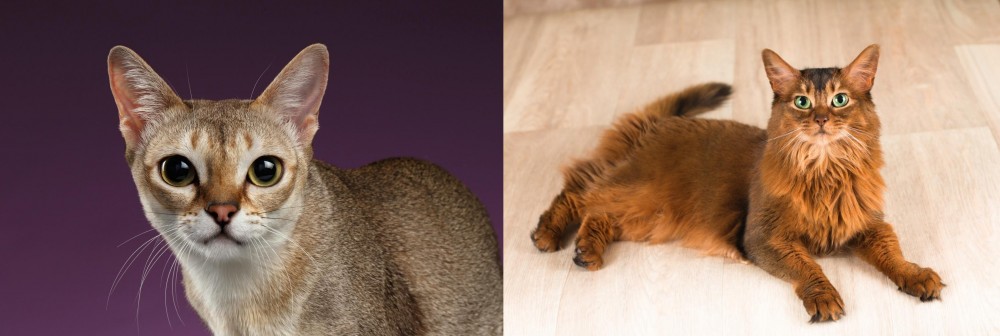 Singapura is originated from Singapore but Somali is originated from United States. Both Singapura and Somali are having almost same weight. Both Singapura and Somali has almost same life span. Both Singapura and Somali has almost same litter size. Singapura requires Low Maintenance. But Somali requires Moderate Maintenance
Singapura is originated from Singapore but Somali is originated from United States. Both Singapura and Somali are having almost same weight. Both Singapura and Somali has almost same life span. Both Singapura and Somali has almost same litter size. Singapura requires Low Maintenance. But Somali requires Moderate Maintenance
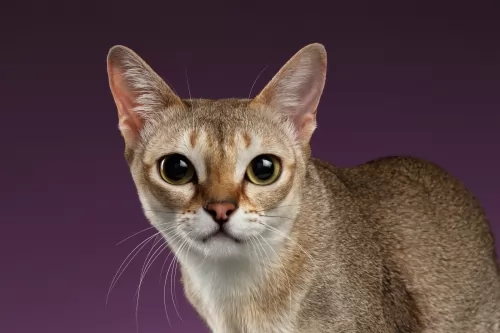 There are conflicting stories surrounding the origination of the Singapura. It does seem however, that natural Singapurans were found in Singapore.
There are conflicting stories surrounding the origination of the Singapura. It does seem however, that natural Singapurans were found in Singapore.
The first documented account was of a cat known as Chiko who was found in a Singaporean SPCA in 1980 by Sheila Bowers and WA Brad.
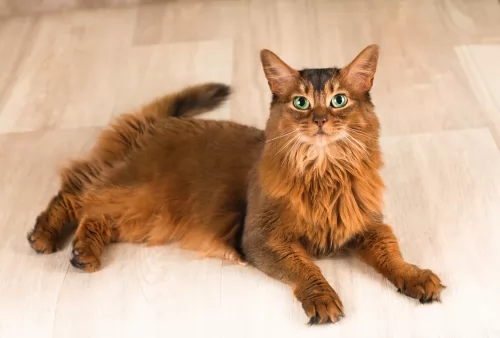 The Somali is a medium- to longhaired Abyssinian. It was in Britain that the original introduction of the longhaired gene took place.
The Somali is a medium- to longhaired Abyssinian. It was in Britain that the original introduction of the longhaired gene took place.
The first Somali cats came about in 1940 and it was British breeder Janet Robertson who exported some of her Abyssinian kittens to New Zealand, Australia and North America, Australia. Most of the kittens had long hair and breeders started showing an interest.
An American Abyssinian breeder Evelyn Mague decided to call her cats Somalis and the breed was recognized internationally by 1991.
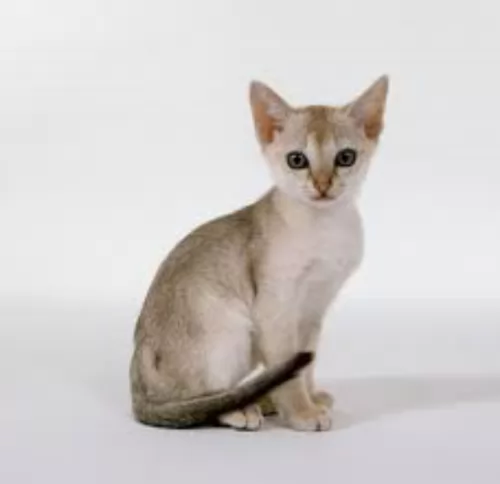 The Singapura cat is small in size, not weighing more than 2, 3 or 4kg. This short-haired, ivory-colored coat has brown ticking.
The Singapura cat is small in size, not weighing more than 2, 3 or 4kg. This short-haired, ivory-colored coat has brown ticking.
The cat is a natural breed and is muscular and strong. It is actually the smallest of the domestic cats. The cat has big ears, large green or yellowish eyes and is often referred to as ‘Pura’.
While the Singapura looks like a small, finely boned cat, when you pick him up, you discover that he is actually deceivingly heavy. The cat has slender legs with the back legs being slightly longer than the front legs. The tail ends with a recognizable black tip.
The Pura is intelligent and inquisitive and loves leaping onto high surfaces to explore. They then love to come bounding down and to land in one of his family member’s laps. This cat is a bundle of energy and playfulness. You'll need to invest in toys for your fun-loving Pura who loves nothing more than to be playing with soft little balls or scampering after a toy-mouse.
He is social and extroverted and gets along well with children and dogs in the house. He isn’t as vocal as some of the other cat breeds and actually has a quiet voice. The Singapura cat personality is outgoing, active and inquisitive and full of tricks and he is always ready to join in with any games.
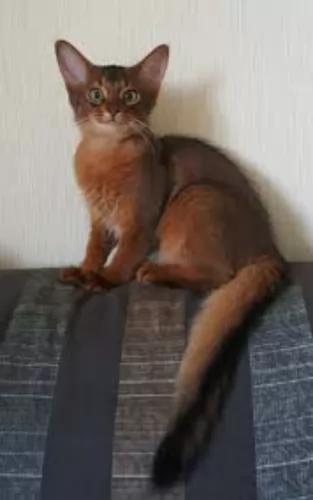 The beautiful Somali is a medium-sized cat which means he weighs in the region of 3 to 6kg. He is muscular and lean with the ears being set wide apart.
The beautiful Somali is a medium-sized cat which means he weighs in the region of 3 to 6kg. He is muscular and lean with the ears being set wide apart.
The ears are also tufted. The eyes of the Somali are almond-shaped and are usually a brown shade or green in color. The legs are long and the paws are also somewhat tufted. The tail is well plumed.
The Somali's coat is lovely and soft, while being thick and lustrous. The adult cats have a ruff. The Somali's coat comes in a range of colors but the most regular color is a beautiful brownish color with black ticking.
The Somali is an intelligent cat that relies heavily on its human owners for company as well as love and care.
They’re fun-loving cats that get on well with children in the home and from other pets. They are active cats and will need exercise. They should have some high perches and cat trees available so they can jump and climb.
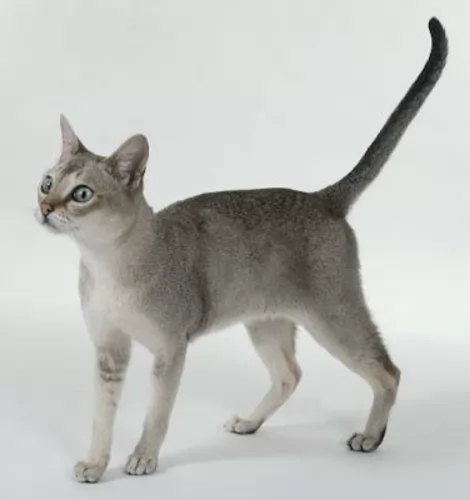 Singapuras make awesome pets and with all their energy and antics they provide hours of entertainment. They are intelligent, energetic, and playful. The people who have them say they become your best friend because they are cats that are sensitive to the moods of their human owners.
Singapuras make awesome pets and with all their energy and antics they provide hours of entertainment. They are intelligent, energetic, and playful. The people who have them say they become your best friend because they are cats that are sensitive to the moods of their human owners.
Dynamite comes in small packages, and that’s exactly what you get when you bring the small Singapura cat into your home and life.
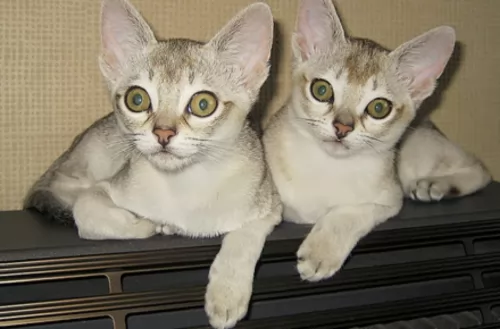 Your sweet Singapura cat has no particular genetic problems to deal with and also no specific health concerns. Although he is a generally healthy cat, one health condition that you want to be aware of is uterine inertia with the females.
Your sweet Singapura cat has no particular genetic problems to deal with and also no specific health concerns. Although he is a generally healthy cat, one health condition that you want to be aware of is uterine inertia with the females.
This particular condition was found in one of the foundation cats and still appears in some Singapura females.
Look after him well and return his love, and health issues will remain low. Having said that, every cat breed can develop health problems, and it pays to understand some of the more common cat illnesses.
Feline Lower Urinary Tract Disease is something that both male- and female cats can get. Watch that your Singapura doesn’t become overweight or unfit because this disease often occurs in cats who have become overweight.
Stress with a cat can also bring about this most uncomfortable disease in your cat. You’ll see your cat straining to urinate, he cries when urinating, and he isn’t his usual chirpy self. He may even have bloody urine. Get your pet to the vet immediately as not being able to urinate is an emergency.
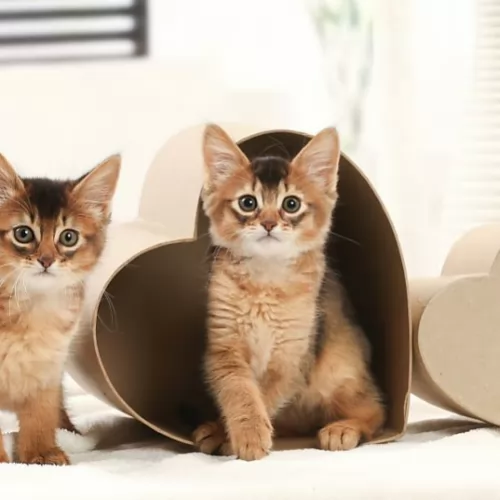 Although the Somali cat breed is healthy, as with many other cat breeds, there are a few hereditary diseases found in the Abyssinian that may be linked to this breed too. Look out for eye problems with the cat as well as anaemia.
Although the Somali cat breed is healthy, as with many other cat breeds, there are a few hereditary diseases found in the Abyssinian that may be linked to this breed too. Look out for eye problems with the cat as well as anaemia.
Progressive retinal atrophy (PRA) is a degenerative disorder of the retina. This eye disease can either be inherited or acquired.
When a cat gets sick there are some antibiotics that have been associated with progressive retinal atrophy in cats. Cats can also develop vision loss if their diet is deficient.
You have to be very aware of your cat’s diet and ensure that he is getting all the right ingredients, one of which is amino acid taurine. If you can see that your cat is battling to see, you should get him immediately to the vet.even though there is no treatment for PRA. . The vet will explain to you how to make life more comfortable for your pet.
Anemia isn’t a specific disease with your cat but rather the result of some other disease or condition. The most common sign that your cat has anemia is that you won’t find that normal pink color of the gums. Your cat will be listless and there may also be signs of blood loss such as blood in the feces or urine. Your vet will do several tests to diagnose the anemia.
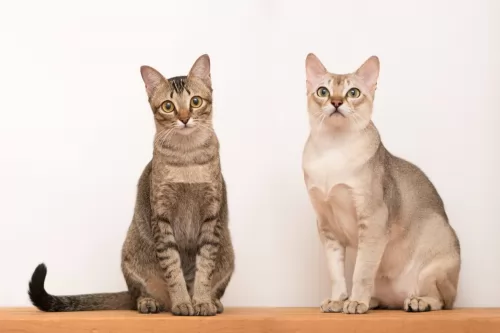 Your Singapura cat’s short coat is easy to groom. Brush your pet every week to remove the loose hairs and to also keep the coat sleek and shiny.
Your Singapura cat’s short coat is easy to groom. Brush your pet every week to remove the loose hairs and to also keep the coat sleek and shiny.
Every cat is a carnivore. Singapuras need meat if you want to avoid your cat getting some of the cat health problems there are. Singapura’s digestive system isn’t designed for foods that humans eat.
He will need high-quality food to ensure his ongoing good health. If you are going to feed your Singapura commercially packaged foods, take a good look at the ingredient list and make sure that meat and protein is at the top of the list.
Always buy age-appropriate food. You can imagine that a tiny kitten’s food requirements will be very different to that of an adult cat.
A kitten will require at least 3 or 4 meals a day. It is always a good idea to consult your vet for suggestions on what brand- and type of food to give your kitten and your adult Singapura.
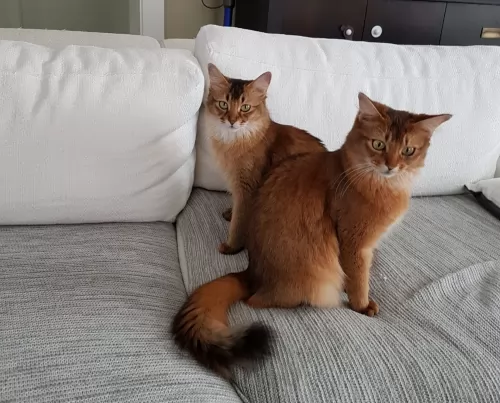 Cats can sometimes be finicky eaters and even the most delectable morsels might be ignored.
Cats can sometimes be finicky eaters and even the most delectable morsels might be ignored.
Every cat is unique but every cat is a carnivore – a meat eater – and requires a host of nutrients in their food to be healthy. Commercial cat foods aren’t all one and the same. You get different food for kittens, different foods for young adults, for pregnant cats, for energetic cats, and so on.
There is cat food for every season of a cat’s life. Other important considerations are feeding the right quantity of food to your cat.